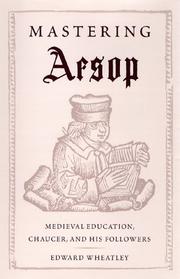| Listing 1 - 1 of 1 |
Sort by
|

ISBN: 0813024137 9780813024134 0813017459 Year: 2000 Publisher: Gainesville, Fla. : University Press of Florida,
Abstract | Keywords | Export | Availability | Bookmark
 Loading...
Loading...Choose an application
- Reference Manager
- EndNote
- RefWorks (Direct export to RefWorks)
"In this first study of a text from the primary school canon, Edward Wheatley examines fable as a mode of discourse in its medieval curricular context and then discusses the ways in which it influenced the work of Chaucer, Lydgate, and Henryson."--Jacket.
English literature --- Fables, Greek --- Fables, English --- Education, Medieval --- Animals in literature. --- Animals in literature --- English --- Languages & Literatures --- English Literature --- Education --- Medieval education --- Seven liberal arts --- Civilization, Medieval --- Learning and scholarship --- Greek fables --- British literature --- Inklings (Group of writers) --- Nonsense Club (Group of writers) --- Order of the Fancy (Group of writers) --- History and criticism. --- Adaptations --- Greek influences. --- History and criticism --- Greek influences --- History --- Chaucer, Geoffrey, --- Lydgate, John, --- Henryson, Robert, --- Aesop --- Aesopus --- Ezop --- Esop --- Esopo --- Esope --- Aisōpos --- Esopus --- Ezovbos --- Ezopos --- Īcāp --- Isop --- אזוף --- אזופוס --- איסופוס --- עזאפ --- イソップ --- 伊索 --- Lidgate, John --- Lydgate, John --- Lidgate, Iohn --- Monk of Bury --- Monke of Burie --- Monk of Bery --- Knowledge --- Literature. --- Appreciation --- Influence. --- Aesop's fables. --- Aisōpou mythoi --- Fables of Aesop --- Fabulae Aesopi --- Īcāp kataikaḷ --- Aesop in Mexico --- Μῦθοι (Aesop's fables) --- Mythoi (Aesop's fables) --- Corpus Fabularum Aesopicarum --- Aesopi --- Äsop
| Listing 1 - 1 of 1 |
Sort by
|

 Search
Search Feedback
Feedback About UniCat
About UniCat  Help
Help News
News